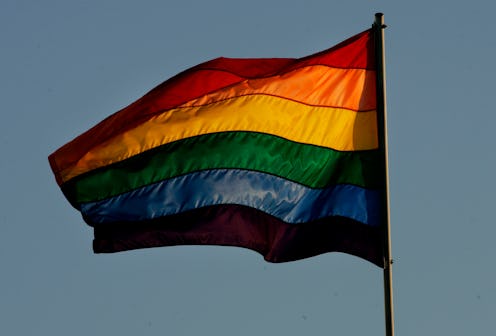News
EU Grants Asylum to Gay Africans. And The U.S.?
Well, it's about time, EU. The 28-member European Union announced Thursday that it now has a binding agreement to protect people who are persecuted based on their sexual orientation. In what was touted as a "landmark decision," Europe's highest court ruled Thursday that gay people in Africa who fear imprisonment may seek asylum in the European Union. Which also happens to be a policy the United States has implemented since 1994.
As part of the new EU policy, victims must present credible threat of jail time based on their sexual orientation. A ban on homosexual activity within an African country is not grounds for asylum in itself, according to the European Court of Justice. The ruling was based on a case of three gay men from Sierra Leone, Uganda, and Senegal who were applying for asylum in Holland — but the decision applies to all EU countries.
The judges ruled:
The court considers that requiring members of a social group sharing the same sexual orientation to conceal it is incompatible with the recognition of a characteristic so fundamental to a person's identity that the persons concerned cannot be required to renounce it. Therefore, an applicant for asylum cannot be expected to conceal his homosexuality in his country of origin in order to avoid persecution.
Ultimately, however, asylum applications will be decided by the 28 individual nations that make up the EU.
Only 12 countries in Africa recognize consensual same-sex relationships as legal. People found guilty of same-sex activity face lifetime jail sentences in Sierra Leone and Uganda. Gays in Senegal face imprisonment of up to 14 years. Worst of all, being gay is grounds for implementing the death penalty in Mauritania, Sudan, and sections of Nigeria and Somalia.
European officials such as Michael Cashman, who heads a European Parliament group on lesbian, gay, bisexual, and transgender rights, view the ruling as a "landmark decision, and the right one" — but other organizations contend that it didn't go far enough. Amnesty International even called it a "missed opportunity" and a "setback." The organization believes there is too much room for error when the ruling is left up to the EU's many individual states. There will likely be different answers in different countries, leading to confusion across the board.
The EU's ruling echoes the United States' asylum policy in many ways, according to Michelle Gonzalez, an Immigration Law Fellow at Immigration Equality.
"We have immigration judges making the same rulings in individuals immigration cases here in the U.S.," Gonzalez told Bustle. "The law is that an individual may seek asylum based on fear of persecution in their home country because they belong a particular social group. Today, sexual orientation is a well-established particular social group."
Gonzalez says there have been numerous individual victories in the U.S. for people fleeing same-sex persecution in their home countries. The policy, which includes transsexuals and HIV-positive individuals, has been in effect since 1994.
"In the past year, asylum has been won for gay and transgender people from various African countries, including Uganda, Cameroon, and Burkina Faso," Gonzalez says. "This is not a policy applied broadly. It is immigration asylum law, and each person's claim is decided on a case-by-case basis — using the person's own evidence and testimony about their particular social group and country conditions about the treatment of that group."
But on the other side of the ocean, questions about the future remain. Is this the first step in the EU also extending asylum rights worldwide, perhaps for gay people currently persecuted in Russia? One Dutch minister, Frans Timmermans, certainly thinks Russia's anti-gay laws warrant asylum in the Netherlands, at least. "The anti-homosexuality propaganda law has a stigmatizing and discriminatory affect and contributes to a climate of homophobia," Timmermans says.
